Watering new grass seed might sound simple and straightforward, but it is something you need to pay close attention to! You cannot just dump water on your new grass seed every so often and expect to grow a lush green lawn. There are some obvious and some not-so-obvious factors that you need to keep in mind while watering new grass seed. In this article, we’ll talk about the best time to water grass seed.
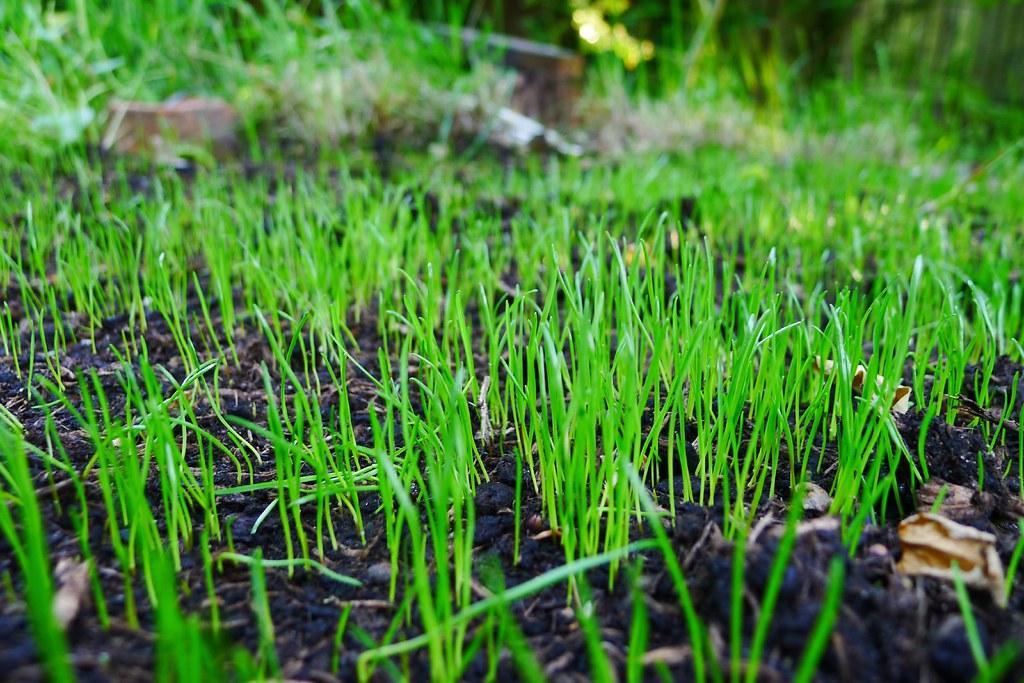
If it hasn’t rained, you will need to water new grass seeds every day!
These factors include the time of the year you plant a seed, local weather conditions and your lawn soil, to state a few. People easily get confused due to all of these variables, and they often have many questions about watering new grass seeds. One of such questions that we frequently receive is what is the best time to water new grass seed?
The best time to water new grass seeds is in the morning and evening. During these times, soil and air temperatures are low, allowing more water to penetrate the ground instead of evaporating. As a result, new grass seeds face a low risk of being dried out, which increases the seed germination rate and is good for your lawn.
However, it is not just the right time that needs to be considered while watering new grass seeds. Many other factors also need to be evaluated before deciding when, how and how much water you should give to your new grass seeds.
Keep reading this article to find out!
Factors Affecting Grass Seed Watering Needs
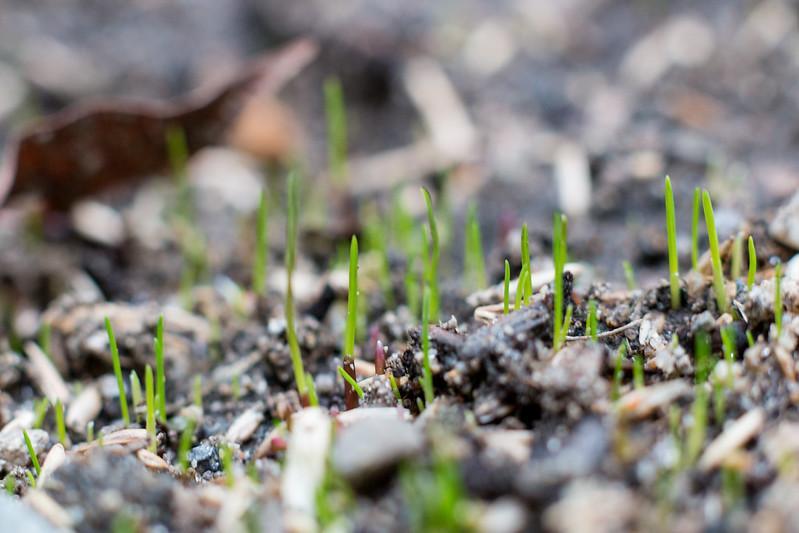
In extreme heat, water the new grass seeds more to account for the lost water due to evaporation.
Before we get into the technicalities of watering a newly seeded lawn, it is essential to understand the factors that can affect the availability of water to the new grass seeds. These factors include soil type, wind, humidity, temperature, rainfall and competition from other vegetation. So, let’s look at these factors first, one by one.
Wind
When it is windy outside, the rate of water evaporation significantly increases. This results in considerable water losses that are not only bad for new grass seeds but also your lawn care costs. So, water your lawn when it is less windy outside.
Humidity
In low humidity situations, the amount of water that you give to the new grass seeds will be relatively quickly lost from the soil. Whereas in high humidity, the opposite will be accurate. So, check your phone’s weather app and adjust accordingly.
Soil Type
Lawn soil with a higher ratio of clay tends to hold water more than other soil types and for a more extended period of time. In contrast, sandy soils lose water much more quickly. So, depending on your lawn soil, you will have to adjust the watering amount and frequency.
Temperature
When it is hot outside, water evaporation will increase. The result is dry soil which could become a severe problem for new grass seeds. So, make sure that you keep the outside temperature into account while watering new grass seeds.
Rainfall
New seed watering needs can also change with the rainfall. For instance, you do not need to water new grass seeds if it has been heavily raining and the soil is saturated. However, if it is just a few light showers, make sure that you fulfill the watering needs of your lawn.
Grass Type
Once the grass seedlings reach a height of one inch, you will have to reduce the watering frequency. Depending on the grass type, the time it takes to reach one inch will vary, changing how you water your lawn.
Competition From Other Vegetation
Suppose your yard is located in an area with large trees and lots of plants. In that case, the ability of the new grass seeds to take up adequate water can be severely impacted. So, make sure that you consider this when watering new grass seed.
RELATED: Will Grass Seed Grow If Not Covered With Soil? Sowing Seeds For A Perfect Lawn
How Often Should New Grass Seed Be Watered?
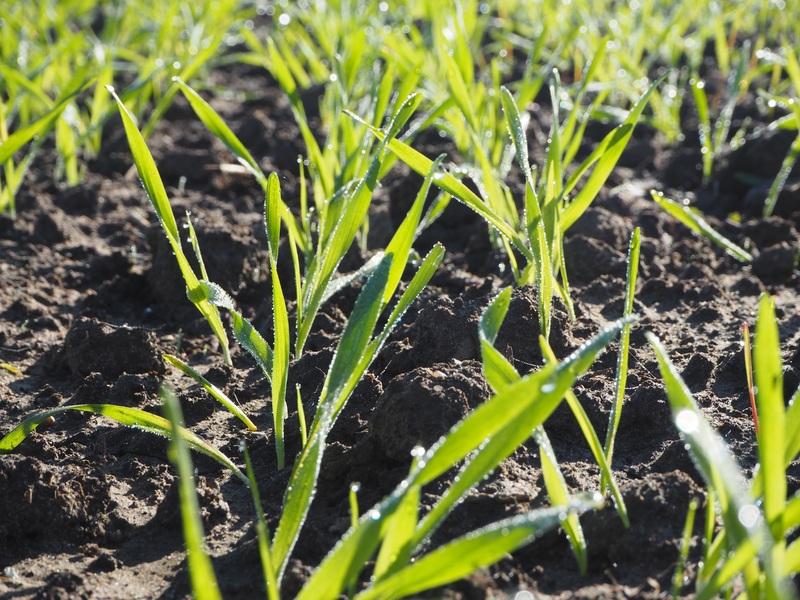
Too much or too little water are both harmful to the new grass seed.
When you have planted new grass seed in your yard, the aim is to keep the soil moist. Moisture is essential for the seeds to germinate properly and keep the new grass seedlings from drying out and dying.
Experts suggest that you water new grass seeds once every day until the grass reaches a length of one inch. However, if you live in a hot arid area, you might have to increase the watering frequency from once a day.
All in all, the purpose is to keep the top ½ inch of the soil from becoming dry until the grass reaches the height of one inch. Also, make sure that you do not overwater your grass. Waterlogged soil can cause the new grass seed to suffocate.
You can check the lawn soil with your hands to determine if it is moist. So, if the soil of your lawn is losing moisture too quickly, you can increase the watering frequency from once a day to twice daily to keep the top layer of soil wet.
What Is The Best Time To Water New Grass Seed?
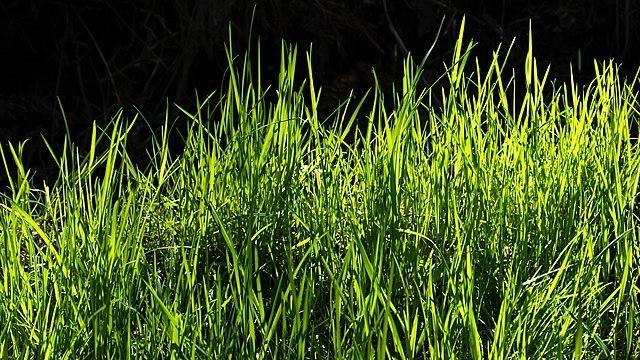
Water your lawn at a time when the rate of evaporation is the lowest.
The best time to water your lawn is in the morning and evening. During this time, the wind speed is low, and there is little sunlight falling on the surface of your lawn. As a result, the rate of water evaporation is low, which keeps the soil moist.
Not only is watering during mornings and evenings better for the new grass seed, but it also conserves water and helps you save money on lawn maintenance.
Is It Better To Water Grass Seed In The Morning Or Evening?
It is best to water your new grass seeds early, between 4 a.m. and 10 a.m. This allows the water to penetrate deep into the lawn soil and keep the seed and growing roots moist during sunny hot days.
However, suppose that you cannot water your grass in the morning due to your schedule or any other reason. In that case, the best time to water your lawn is in the later afternoon or early evening.
However, do not wait too late to water your lawn in the evening. It can make your lawn prone to fungal diseases.
RELATED: How Long Does It Take For The Grass Seeds To Grow? Growing Grass The Easy Way!
Water Timer For Sprinklers
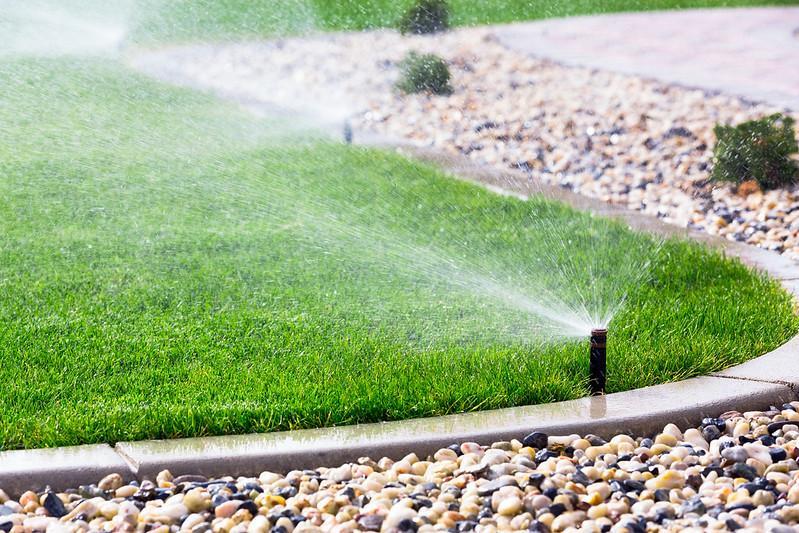
Water sprinklers are great for watering your lawn uniformly all across.
If you cannot find time to regularly water your newly seeded lawn at a proper time due to your busy schedule or any other reason, water timers for lawn sprinklers can be of assistance. You can water your lawn quickly and efficiently without the hassle by using lawn sprinkler timers to water new grass seeds.
If your lawn is large, you can use a rectangular sprinkler, and if it is small, you can get a spot sprinkler for the lawn. However, we highly recommend that you also keep a water hose with you. It will be helpful in times when you need to water your lawn manually.
How Long Do You Need To Water New Grass Seed?
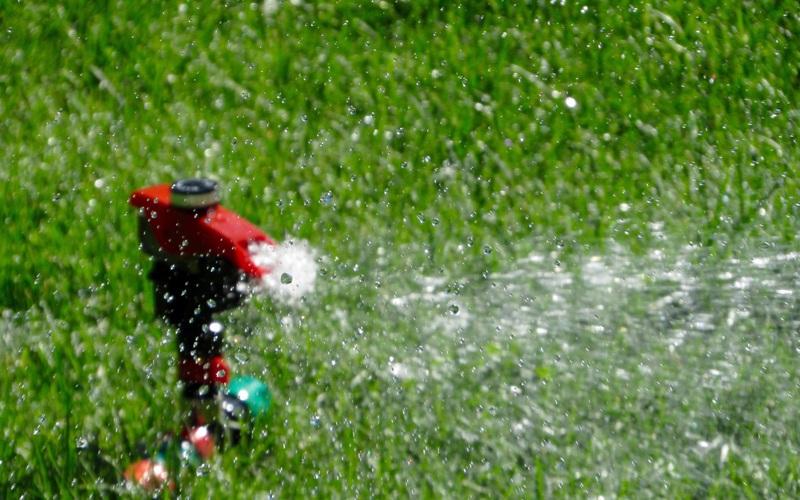
Timing of watering sessions is also crucial to healthy grass growth.
Typically, you should water your lawn deeply and infrequently to promote deep root growth. However, it is not the case with new grass seeds. For new grass seeds, the top layer of the soil always needs to be kept moist so that the seeds or newly sprouted grass seedlings do not risk drying out in the heat.
So, new grass seed will need to be watered for a few minutes twice a day. It could take anywhere between two to five minutes, depending on how you water your lawn and the nature of the soil in your lawn.
As the new grass grows, you can start watering your lawn deeply and less frequently. This will ensure deep root growth, making your grass more drought tolerant.
How Much Water Do New Grass Seeds Need?
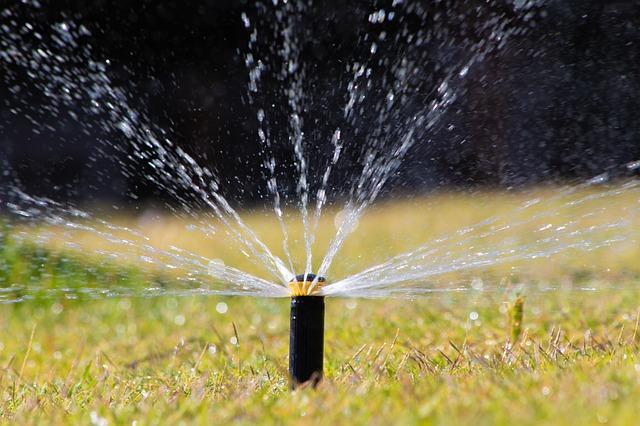
Always water new grass seeds at an angle, or they might flush away.
Another question people usually ask is how much water new grass seeds need? It is harmful to both over and underwater new grass seed. Watering too little comes with the risk of grass seeds drying out, and watering too much increases the chances of lawn diseases.
To make sure that your grass seeds are not receiving too much water, make sure that the soil of your lawn is moist but not soggy. Also, see if there are any water puddles. If that’s the case, lower the amount of water that you give to your grass.
Another thing to keep in mind when watering grass seed is that you should water your lawn at some angle. If you directly spray water onto your grass seeds, they might flush away with the coming water, ruining your lawn.
RELATED: What Is The Best Time To Plant Grass Seed In Spring? Grow A Perfect Lawn!
Which Grass Seeds Need Less Water?
Regardless of what variety of grass you plant in your new lawn, they all need roughly equal amounts of water for the seeds to germinate. However, once they are all around one inch tall, you can reduce the watering frequency and amount. Also, depending on the type of grass that you have, you might need to water your lawn less frequently.
Some of the quickest growing grasses include Tall fescue and perennial ryegrass, while some of the most drought-resistant grasses include Bermuda grass and buffalo grass.
How To Water Grass Seed In Drought?
If you live in an area with water shortages, using fresh water and too much of it to water grass seeds is not good. Luckily, there are ways in which you water your lawn even during water shortages or drought.
- One way is to keep rain barrels. You can collect rainwater in these barrels and then use it to water your grass or seeds in your yard.
- You can also reuse water from your home. Just make sure that it does not have any harmful chemicals that can damage new grass seed.
Tips For Watering Grass Seeds
Here are a few quick tips to help you water grass seeds and get the maximum out of it:
- Cover the lawn surface with mulch before watering the grass seed. It will reduce the evaporation rate and prevent seeds from flushing off.
- Avoid watering your lawn during the night and the hottest parts of the day.
- Some companies sell seeds with a coating that holds moisture. You can use those in areas with water shortages; however, these seeds are expensive.
- Do not buy cheap water sprinklers. They do not spread the water evenly in the yard.
- If there is a water runoff concern in your yard, use oscillating sprinklers.
- If you see fungi or moss growing in a newly seeded lawn, reduce the water.
- Keep the soil moist but not soggy. Waterlogged soil can suffocate grass seedlings.
- Reduce the watering frequency once the grass reaches a height of around one inch.
Frequently Asked Questions (FAQs)
Should grass seed be watered at night?
You should never water grass seed at night. It results in water staying too long on the surface of your lawn which makes your grass prone to many fungal diseases.
Is it ok to water grass seed in the sun?
You should avoid watering grass seeds during the sunniest and hottest times of the day. It will result in water escaping too quickly from the soil and thus unavailable to the grass seeds and seedlings.
Can you overwater new grass seed?
Overwatering grass seeds can result in many undesirable outcomes. For instance, it can reduce seed germination rates and increase the chances of lawn diseases.
Should you water grass seed every day?
The purpose of watering grass seeds every day is to keep the soil moist. So, if there has been raining or you feel like the soil is still wet from previous watering sessions, you can skip a day or two of watering your new grass seed.
How long does it take grass seed to germinate and sprout?
Most grass types start to germinate within 10 to 25 days of planting seeds. However, sometimes it can take up to 30 days. Nonetheless, make sure that your seeds get plenty of moisture and do not dry off during this time.
How can I make grass seed grow faster?
The best way to make your grass seed germinate faster is by keeping them moist and giving them starter fertilizer food. It will help the grass grow quicker and thicker.
Is morning dew enough for grass seed?
It all depends on the weather conditions during the day. Morning dew can quickly dry up if it’s a sunny day ahead or winds are blowing.
What happens if I miss a day of watering grass seed?
In most cases, missing a day of watering your grass seed won’t kill them. However, you should avoid it as much as you can.
Sources For Further Reading
How should I water a newly seeded lawn? Retrieved from, Iowa State University Extension and Outreach
Watering Newly Seeded Areas. Retrieved from, Purdue University Turfgrass Science at Purdue University
Care and Maintenance of a Lawn after Seeding. Retrieved from, University of Maryland Extension
Editor’s Recommendations
Is Having Micro Clover In Your Lawn Worth It? Pros & Cons Of Micro Clover In Grass!
How To Mow Wet Grass? and What Is The Best Way To Mow Wet Grass!
How To Fix Lawn Mower Sputtering: Common Reasons & Easy Fixes!







